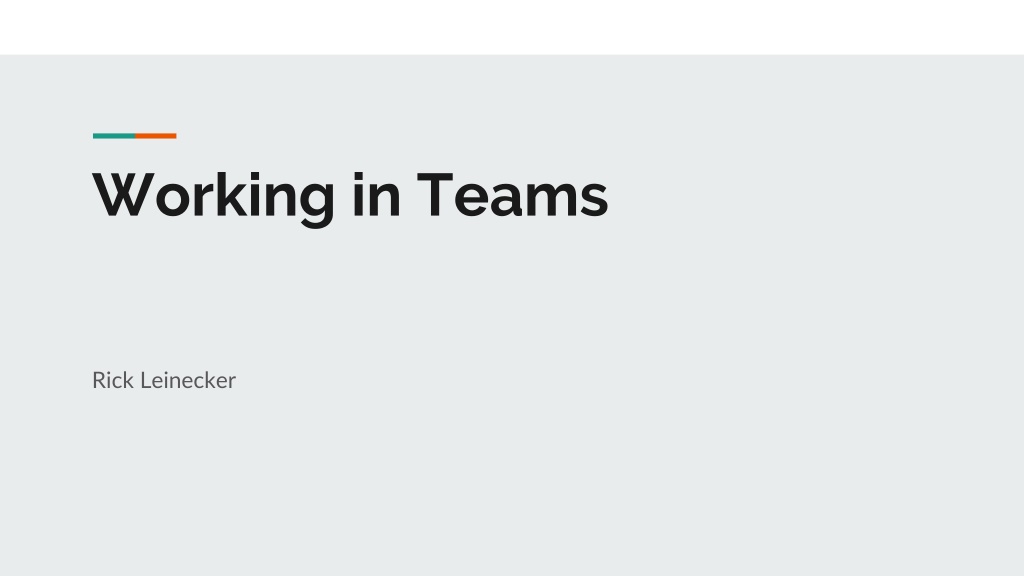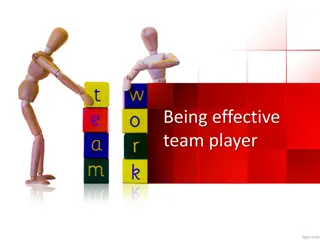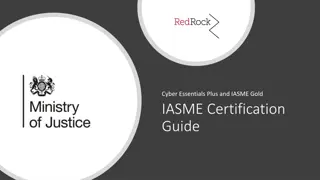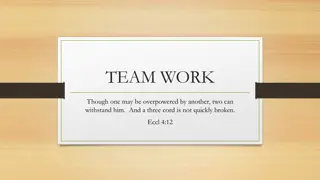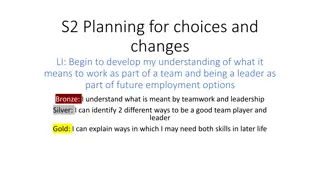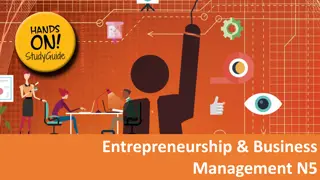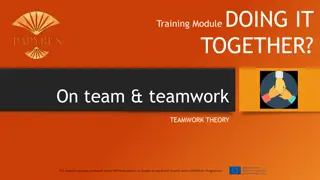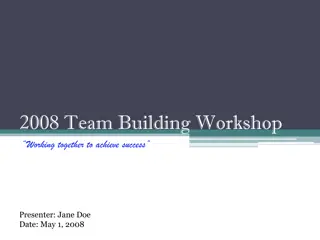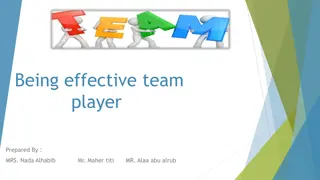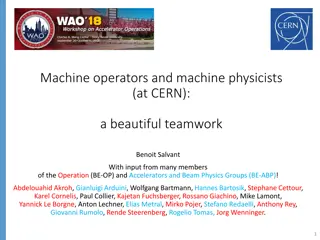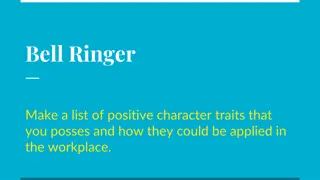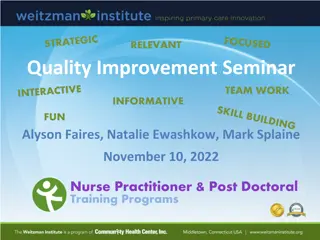Effective Teamwork Essentials for Success
Understanding the key elements of successful teamwork including team composition, task suitability, and organizational support. Explore the functions of teams, roles, communication, and decision-making, along with conditions for team success and the importance of a supportive context.
Download Presentation

Please find below an Image/Link to download the presentation.
The content on the website is provided AS IS for your information and personal use only. It may not be sold, licensed, or shared on other websites without obtaining consent from the author.If you encounter any issues during the download, it is possible that the publisher has removed the file from their server.
You are allowed to download the files provided on this website for personal or commercial use, subject to the condition that they are used lawfully. All files are the property of their respective owners.
The content on the website is provided AS IS for your information and personal use only. It may not be sold, licensed, or shared on other websites without obtaining consent from the author.
E N D
Presentation Transcript
Working in Teams Rick Leinecker
1. Team Success 2. Team Goals and Activity 3. Social Loafing 4. Roles and Behaviors 5. Communication 6.Conflict 7. Decision-Making
Why Teams? What teams have you been a part of? Teams differ from groups, in that they have applied functions. Your role on a team relates to the function you provide to it. Does your team have clearly defined roles? What function are you performing? Organizations are shifting away from individual work performed in hierarchical structures and toward team-based operations. (Levi, 14)
1. Team Success 2. Team Goals and Activity 3. Social Loafing 4. Roles and Behaviors 5. Communication 6.Conflict 7. Decision-Making
Four Conditions for Team Success: 1. The team must have the right people to perform the task. (Team Composition) 2. The task must be suitable for teamwork. (Task Characteristics) 3. The team must combine its resources effectively to complete the task. (Group Process) 4. The organization must provide a supportive context for the team. (Organizational Context) When were you on a team that was not successful. Which of these conditions were not met?
Team Composition Do team members have the needed knowledge, skills, and abilities? If everyone on the team is highly talented at the technical tasks, isn t success guaranteed? Why or why not? Besides talent, successful teams will include members who have interpersonal skills, problem-solving skills, and teamwork skills. (And companies/organizations will look for this.)
When Are Teams Appropriate for the Task? The work contains at least some skilled activities. The team can form a meaningful unit within the organization, with clearly defined input and output and stable boundaries. Valid performance evaluation systems exist for both the team and its members. Timely feedback is possible. The team is capable of measuring and controlling the important variances in the workflow. The tasks are highly interdependent so members must work together. Have you ever been on a team where the task was not suitable for teamwork?
1. Team Success 2. Team Goals and Activity 3. Social Loafing 4. Roles and Behaviors 5. Communication 6.Conflict 7. Decision-Making
Team Goals: Serve as a standard that can be used to evaluate performance Motivate team members by encouraging their involvement in the task Provide a criterion for evaluating whether certain actions and decisions are appropriate Serve as a way to inform outside groups about the team and establish a relationship with them Determine when team members should be rewarded or punished for their performance Have you ever been on a team without clearly defined goals? What are the current goals for your
Stages of Teamwork: Stage: Activity: Forming Orientation: members getting to know one another Storming Conflict: disagreement about roles and procedures Norming Structure: establishment of rules and social relationships Performing Work: focus on completing the task Adjourning Dissolution: completion of task and end of the group
1. Team Success 2. Team Goals and Activity 3. Social Loafing 4. Roles and Behaviors 5. Communication 6.Conflict 7. Decision-Making
Social Loafing: When Someone is Slacking Off When an individual works in a team rather than alone, there is a potential reduction of contribution. This can happen for a variety of reasons: The free rider : when one believes that, regardless of their individual effort, they will receive a fair share of the team s reward The sucker effect : when a high performer slacks off, in order to not feel taken advantage of by lower performing team members
Why Arent They Pulling Their Weight? If the team s goal is merely a collection of individual tasks requiring no coordination, this can lead to a lack of motivation, which causes social loafing. Individual performance can easily be hidden in a team s effort, leading to social loafing, as one no longers cares about what others think about their performance. People tend to overestimate their contributions to a team s effort, leading to social loafing, as they feel they ve already done their part .
Overcoming Social Loafing Perform truly interdependent tasks. Increase team motivation. Clarify team roles. Make each individual s participation observable and measurable. When have you been part of a team with a strong sense of identity and high motivation, which prevents social loafing? Sports teams are very good at avoiding social loafing. Why?
1. Team Success 2. Team Goals and Activity 3. Social Loafing 4. Roles and Behaviors 5. Communication 6.Conflict 7. Decision-Making
Team Roles Roles are one of the basic building blocks of successful teams performance. A role is a set of behaviours typical of people in certain social context. Roles within a team are similar to roles in a play: They describe what people are supposed to do and how their parts relate to what others in the team are doing. (Levi, 71) Role Ambiguity and Role Conflict are sources of relational stress within a team which interfere with both team motivation and accomplishing tasks. These tend to worsen as a project gets closer to the deadline. How would you define each?
The Two Types of Team Behaviors Task Behaviors focus on the team s performance goal Examples: information sharing and back-up assistance Social Behaviors focus on maintaining emotional balance and healthy team relationships Examples: recognition and encouragement Both are crucial for accomplishing team goals. It can be very easy for project-oriented teams to ignore the necessity and importance of the relational aspects of teamwork that lead to higher team performance.
1. Team Success 2. Team Goals and Activity 3. Social Loafing 4. Roles and Behaviors 5. Communication 6.Conflict 7. Decision-Making
Communication: The Foundation of Everything Good communication skills: foster trust establish appropriate team norms develops a collaborative and creative climate These benefits must be maintained over time through continued effort. They are not merely attained once, then last forever. (What happens to a friendship when two people stop communicating over a long period of time?) Communication is important for both the task-oriented behaviors and social-oriented behaviors: it will maximize productively as well as foster team cohesion. Both are important for team success.
Bad Communication Habits Teams have the potential to make better decisions than individuals. Why? However, there also exists the potential for dysfunction in how information is processed: Focusing on common information shared by all instead of considering specialized, unique information known by few. Seeking only information that confirms pre-existing beliefs and attitudes and ignoring information that is perceived as a threat to currently held beliefs (a.k.a Confirmation Bias : You tend to find only what you expect to see). Processing information only in terms of False Dichotomies: the tendency to view options only in terms of two opposing extremes, when, in reality, many possibilities exist.
Positive vs. Negative Communication Patterns Evaluation vs. Description Control vs. Problem Orientation Deception vs. Honesty Neutrality vs. Empathy
How to Have a Good Team Meeting: Only have a meeting when there is no other alternative. Put the purpose of the meeting in writing and share it with everyone before the meeting (a.k.a. Agenda). Start and end the meeting on time. It demonstrates competency and shows respect. Minimize disruptive behaviors (like when one person dominates the conversation) and verbally affirm acceptable behavior. Deal with persistent problems privately. Put in writing a summary of important discussion and significant decisions that were made for everyone to reference (a.k.a. Minutes).
1. Team Success 2. Team Goals and Activity 3. Social Loafing 4. Roles and Behaviors 5. Communication 6.Conflict 7. Decision-Making
Misconceptions about Conflict: All conflict is bad and should be avoided. All conflict is caused by misunderstandings amongst team members. All conflict can be resolved to everyone s satisfaction. The Reality: Conflict is inevitable. It is produced by change. It is often beneficial to the team s success.
Healthy Conflict Arises from: Focusing on task issues Legitimate differences of opinion about the task Differences in values and perspectives Different expectations about the impact of decisions
Unhealthy Conflict Arises from: Competition over power, rewards, and resources Conflict between individual and team goals Poorly run team meetings Personal grudges from the past Faulty communication
Approaches to Conflict Resolution: Collaborating: working together to intentionally solve a problem Compromising: bargaining when a win-win isn t possible Accommodating: smoothing out a situation by giving up on a position Forcing: compelling a zero-sum solution in a win-lose situation Avoiding: withdraw or delay dealing with an issue Each approach has pros and cons. Can you figure out what they are?
Steps for Negotiating a Solution: Separate the people from the problem Focus on shared interests Develop many options to be used as a solution Evaluate the options using objective criteria Keep trying When have you successfully negotiated a solution to a team conflict?
1. Team Success 2. Team Goals and Activity 3. Social Loafing 4. Roles and Behaviors 5. Communication 6.Conflict 7. Decision-Making
The Decision-Making Spectrum Leader-Oriented: leader decides; leader assigns expert to decide; leader consults team then decides Team-Oriented: objective mathematical technique; structured process; pure democracy, where majority rules Full Consensus: all members participate until agreement on a decision Can you name the advantages and disadvantages of each decision making approach?
Determining the Right Approach: Is a high-quality decision required? Does the team/individual have enough information to make a decision? Is the problem structured? Who will be tasked with implementing the decision? What is the social standing of the team leader? Do members agree on how team goals are attained?
Guidelines If Youre Going for a Full Consensus Avoid arguing for your own position without listening to the position of others. Do not change your position just to avoid conflict. Do not try to reach a quick agreement by using conflict-reduction approaches, such as voting or tossing a coin. Encourage others to explain their position so that you better understand any differences. Do not assume that someone must win and someone must lose when there is a disagreement. Discuss the underlying assumptions, listen carefully to one another, and encourage the participation of all members. Look for creative and collaborative solutions that allow both sides to win rather than compromises where each side only gets some of what it wants.
Acknowledgment: Group Dynamics for Teams, 5th ed. by Daniel Levi
